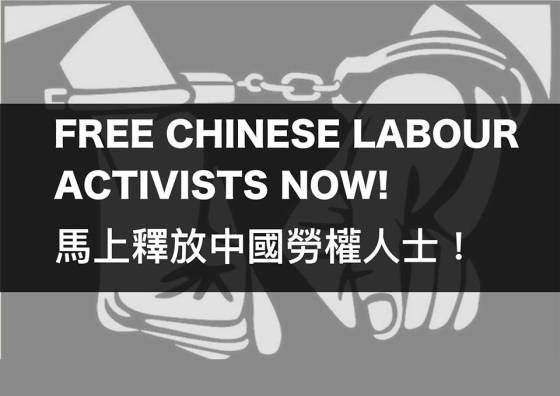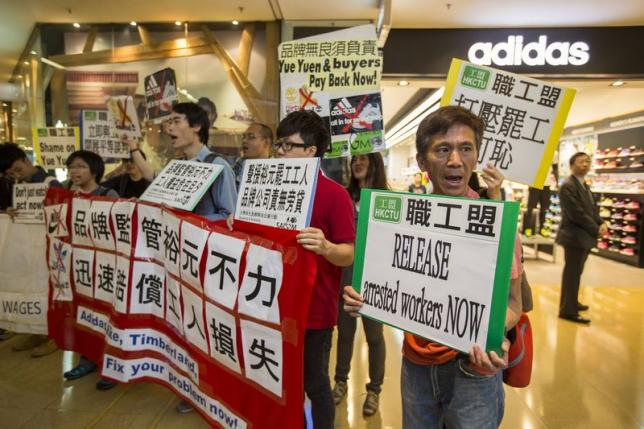The following was posted to the Talking Union blog by Paul Garver:
I am writing this on the evening of 9th December in the USA, but in Hong Kong it is already the morning of 10th December. At this moment labor and human rights activists are converging on the Western Police Station in Hing Kong to demand that the Mainland Chinese authorities in neighboring Guangdong Province release several labor rights activists rounded up over the last few days.
December 10th is International Human Rights Day, intended to commemorate the adoption of the Universal Declaration of Human Rights. Chinese authorities, panicked by an accelerating wave of actions by workers protesting factory closures and non-payment of wages, are trying to stifle workers’ desperate defensive protests by detaining labor rights activists and closing worker rights centers.
This is no trivial matter. The Pearl River Delta on the mainland opposite Hong Kong represents the largest and densest concentration of industrial workers on the planet. The Chinese Communist Party and local government authorities above all want to maintain a subservient and docile working class. In order to do so, they are willing to crush the worker centers that, in the absence of genuine labor unions in China, offer the few sparks of hope and support for workers struggling for their basic rights and working conditions.
The Hong Kong labor and human rights activists, who recently fought a brave and protracted battle of their own for democratic rights in Hing Kong, are acting out of solidarity with their Mainland China compatriots who lack such fundamental rights of free association.
We in our turn must demonstrate our solidarity with and support for rights activists both in Mainland China and in Hong Kong. If human rights are not universal, they are not secure anywhere.
Stay tuned for the measures that these activists will be asking their sisters and brothers elsewhere to take in support and solidarity.
Paul Garver
_________________________
Talking Union is the blog of the Democratic Socialists of America.
In an earlier post, Paul Garver reported on the detention of the labor activists: https://talkingunion.wordpress.com/2015/12/07/chinese-authorities-detain-labor-rights-activists/.
Other sources on the efforts to quell labor activism in China have included:
From Labor Notes, “Chinese Labor Activists Detained En Masse”: http://www.labornotes.org/blogs/2015/12/chinese-labor-activists-detained-en-masse.
From the New York Times, “China Arrests at Least 3 Workers’ Rights Leaders Amid Rising Unrest”: http://www.nytimes.com/2015/12/06/world/asia/china-arrests-at-least-3-workers-rights-leaders-amid-rising-unrest.html?_r=0.
From the Wall Street Journal, “China Detains Labor Activists as Authorities Sweep Industrial Hub”: http://www.wsj.com/articles/china-detains-labor-activists-as-authorities-sweep-industrial-hub-1449321000.
From the China Post, “Labor Activists Detailed in China, Say NGOs”: http://www.chinapost.com.tw/china/national-news/2015/12/07/452871/Labor-activists.htm.
From China Labour Bulletin, “Labour Activists Detained for Doing the Job of the Trade Union”: http://www.clb.org.hk/en/content/labour-activists-detained-doing-job-trade-union.
From Radio Free Asia, “Chinese Police Raid Labor Rights Groups, Detain At Least Five Activists”: http://www.rfa.org/english/news/china/chna-labor-12072015094507.html.
From China Digital Times, “Labor Activists Detained amid Civil Society Crackdown”: https://chinadigitaltimes.net/2015/12/labor-activists-detained-amid-civil-society-crackdown/ .
A new book on the topic is available through Palgrave MacMillan—Parry P. Leung’s Labor Activists and the New Working Class in China: Strike Leaders’ Struggles:
Here is the publisher’s blurb: Labor Activists and the New Working Class in China is an ethnographic work examining an export jewelry industrial district in Pearl River Delta of China. While well known that China is undergoing an unprecedented capitalist transformation, few have noted the new working class of China are also actively striving to alter their fate through labor struggles. Parry Leung lived for twelve months in the migrant worker dwelling sites and kept close contact with the strike activists. Leung illuminates how strikes emerge and transform in an authoritarian state, by enhancing our understanding on the informal agency power of strike organizers in labor activism.









Reblogged this on Ohio Labor.
Pingback: Updates on the Detention of Chinese Labor Activists | The Academe Blog